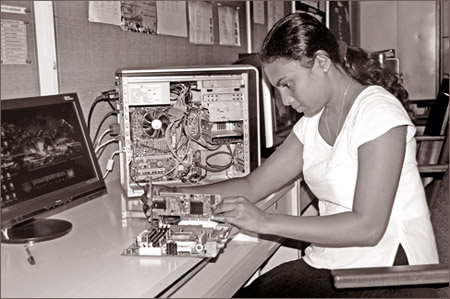Technical education and vocational training in SL
Present status and future directions:
Earle Fernando
|

Vocational training file photo
|
What is Technical Education and Vocational Training (TEVT)? Generally
it refers to skill training related to industrial, manufacturing,
construction and service sectors. In other words, training related to
non-farm occupations. Also, it refers to education and training outside
the general education and higher education systems. And TEVT covers a
diverse range of activities, which are undertaken by the government,
non-government and private sector organizations.
In the recent past, a considerable amount of work has been done to
reform and rationalize the TEVT sector. It is, therefore, useful to
discuss very briefly the outcomes of reforms and rationalization
initiatives of the government.
Over the past four decades, the socio-economic setting of Sri Lanka
has changed considerably. Among the most significant changes that
brought about social upheavals were youth insurrections of 1971 and
1989. And, in 1978, the introduction of liberalized economic policies
set in motion a radical shift in the economy.
As a response to the youth insurrection of 1971, the government
established the National Apprenticeship Board (NAB). One of the
recommendations of the Youth Commission, which probed into the youth
uprising of 1989, was the establishment of the National Education
Commission (NEC). In 1990, the government set up the Tertiary and
Vocational Education Commission (TVEC).
Technical education was traditionally with the Education Ministry for
over a century. And vocational training was part of the employment
services of the Labour Department. In 1994, the government took a bold
step of bringing together the main government agencies responsible for
technical education, vocational training, apprenticeship, technical
teacher training and the TEVC under one ministry. This made it possible
for Technical Education and Vocational Training (TEVT) to be mutually
supportive, complementary functions. Also, for the first time, TEVT
sector was elevated to a ministerial function.
In 1977, the government liberalized the economy. And the liberalized
economic setting diminished the role of government and boosted the
involvement of the private sector in production, manufacturing,
construction and services. Consequently, reform and redirection of
education and training became an urgent necessity.
Hence, in 1995-1996, three Presidential Task Forces on General
Education, Higher Education, and Technical Education and Vocational
Training (TEVT) were charged with the responsibility of formulating
reforms in these respective sectors.
The Presidential Task Force on Technical Education and Vocational
Training Reforms recommended sector-wide policy reforms. These were
categorized under four main thrust areas. The most significant steps
initiated under each of the main thrust areas of TEVT Reforms are
outlined under the following headings.
The role of the government
The Task Force on TEVT Reforms recommended that the government should
move away from being the main provider of training and become its
facilitator, standard-setter, regulator and coordinator. Accordingly,
the private sector was given a more active and participatory role. And
the Tertiary and Vocational Education Commission (TVEC) was
reconstituted and converted to a statuary body with greater autonomy and
increased representation by the private sector. Thus, TVEC was made a
more functional and effective organization with enhanced capacity and
capability to set skill standards, ensure quality, and to regulate and
coordinate TEVT.
The private sector participation in particular, made it possible for
the TEVC to respond more closely to emerging skill needs of the labour
market.
The involvement of the private sector in planning and implementation
of TEVT
Private sector investors were given a range of incentives including
grants, duty-free imports, and tax concessions to set up training
facilities. The government also established the Skills Development Fund
(SDF) to assist the employers to get their employees trained in new
skills.
The SDF commenced in July 2000 with a contribution of Rs. 100 million
from the government, and Rs. 1 million each from the Employers
Federation of Ceylon (EFC) and from a private sector entrepreneur. This
entrepreneur became the first chairman of SDF. And even with all these
incentives, there was lack of motivation on the part of employers to pay
for training and upgrade the skills of their employees. Their preferred
option was to poach trained workers from other companies. This practice
is very common even in more developed countries.
Linkage between general education, university education and TEVT
The Task Force recommended that the TEVT system should offer
opportunities to thousands who leave the general education system at
different points to progressively acquire a certificate, diploma and
degree level qualifications.
This was aimed at making TEVT more attractive to the large number of
students who miss opportunities for higher education including admission
to traditional universities.
The Task Force also recommended the establishment of a
degree-awarding institution at the apex of the TEVET system exclusively
for those following TEVT.
Accordingly, the government gave priority for the establishment of a
University of Vocational Technology (UNIVOTEC).
To be continued
|



